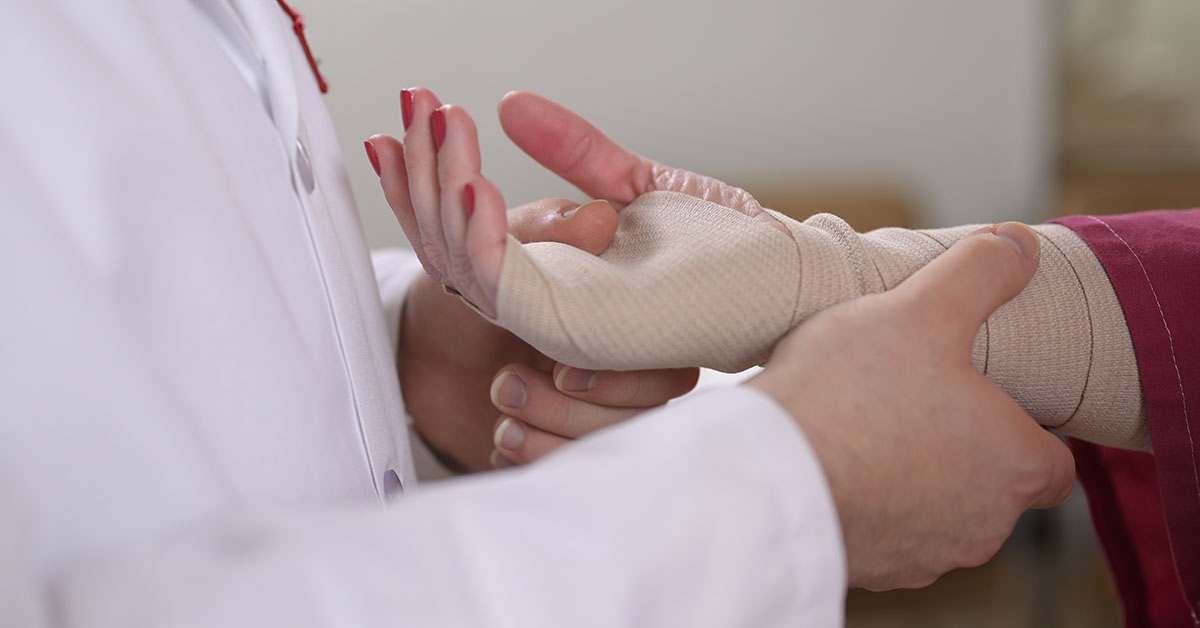
5 Things To Know About Lymphedema
-
Many people who have had cancer are at risk for developing a condition called lymphedema, which can be a result of some cancer treatments. It’s important to understand what lymphedema is and what you should do about it if you develop it. Here are five points to keep in mind about lymphedema.
1. Not all swelling in cancer patients is lymphedema.
Lymphedema happens when the lymph system becomes blocked or damaged. As a result, fluid builds up in soft body tissues and causes swelling, often in an arm or leg. But, if you are a cancer patient and have a swollen extremity, don’t automatically assume it is lymphedema.
“It’s important that patients know that lymphedema is a specific disease process,” said M. Shuja Shafqat, MD, a plastic and reconstructive surgeon at Fox Chase Cancer Center. “There are lots of causes of swelling, and they’re not all lymphedema.” That’s why a careful diagnosis is crucial.
2. There are two types of lymphedema, and one is more common than the other.
“When we think about lymphedema, there are two main types—primary and secondary.” Shafqat said.
Primary lymphedema has a genetic cause and is rare. Secondary lymphedema is most common.
Secondary lymphedema is caused when a person’s lymphatic system is damaged. For people with cancer, this is usually tied to surgery, radiation, or a combination of both, which increases the risk. The risk of developing lymphedema can increase depending on the type of cancer and the area of the body that’s impacted.
“For instance, people who’ve had breast cancer treatment are at an increased risk for lymphedema if they’ve had lymph nodes removed from their armpit and they’ve had radiation,” Shafqat said. “The risk of lymphedema can go up to almost 40% or 50% for these patients.”
People who’ve had cervical, urinary, or genital cancers can also have a heightened risk. This can be a result of lymph node removal followed by radiation treatment to the groin. Some melanoma treatments can also increase the risk of lymphedema.
3. Left untreated, lymphedema can cause major problems.
Lymphedema can cause abnormally swollen arms and legs as well as other conditions:
- Limit movement
- Lead to numbness
- Harden skin
- Flare up due to minor wounds and infection
People with untreated lymphedema may have difficulty with daily activities and be more vulnerable to injury. That’s why getting early medical help is important.
Lymphedema can develop at any time—even years after cancer treatment. But no matter when you notice changes, talk to your care team right away.
“Early recognition and treatment can make a big difference,” Shafqat said.
4. Certified therapists can help you control lymphedema.
Lymphedema can’t be cured, but certified lymphedema therapists are trained to help manage the condition. Your treatment plan might include compression garments, diet changes, massage, exercise, and skin care.
“We have many certified lymphedema therapists at Fox Chase, and they’re very comfortable with and knowledgeable about all the therapies available,” Shafqat said. “They have lots of techniques they can use to help patients. It’s important to see a certified lymphedema therapist because therapy is still the main and gold standard treatment for lymphedema.”
5. You can lower your risk of developing lymphedema.
According to the American Cancer Society, these tips may help you avoid lymphedema or keep it from getting worse:
- Manage your weight. Obesity increases your risk for lymphedema and can make it harder to treat. Ask your cancer care team what is a healthy weight for you.
- Find out what types of exercise are safe for you to do. Certain exercises can help reduce your risk for lymphedema, and some can make lymphedema more manageable after it starts. Talk with your cancer team about exercising. A certified lymphedema therapist can show you safe and effective ways to exercise.
- Let your doctor know right away if you experience any changes in the size, color, temperature, or feeling of the part of your body—including your skin— where you were treated for cancer.
- Avoid wearing anything—clothing, jewelry, or undergarments—that fits too tightly or puts pressure around your chest, arm, wrist, waist, legs, or genitals. If you’re told you might benefit from a compression garment, make sure it fits well and that you wear it properly.
- Try to avoid infections, burns, or injuries, which can all trigger lymphedema. Practice good hygiene, skin care, and nail care. Clean and treat any cuts, scrapes, bug bites, or hangnails. Use sunscreen and insect repellent to protect your skin.
If you or a loved one is concerned that you might be developing lymphedema or if you have been diagnosed with lymphedema, it’s important to seek care from someone that specializes in treating this condition.
Learn more about lymphedema treatment at Fox Chase Cancer Center.
